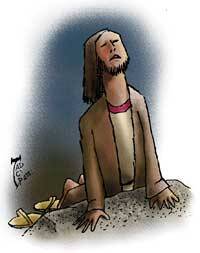Obedient Unto Death
I remember as a child looking at gruesome pictures of the crucified Jesus in our family Bible. I was very disturbed by them, but I found comfort in thinking that since Jesus was God he didn’t feel the suffering in the same way we would. I also knew that he was unique and thought that what happened to him would not happen to anybody else. The Gospel, however, makes very clear that what Jesus underwent as a rejected prophet can, indeed, be asked of any of his disciples. In addition, it portrays for us how to prepare for and how to endure suffering that comes from following in his footsteps.
Luke, more than the other Evangelists, emphasizes Jesus’ role as prophet and interprets the death of Jesus as rejection of his prophetic teaching and actions. Like all prophets, Jesus is lauded by those lifted up by his good news, but those whose privileged position is threatened by him seek to silence and kill him. In the passion narrative, we see Jesus facing deadly opposition and struggling one final time to discern what is the way to obediently bring his prophetic mission to completion. He prepares his disciples for his own death, instructing them at the Last Supper and modeling for them how they are to act as they continue his prophetic mission.
At Gethsemane, Jesus is kneeling upright, not prostrate on the ground, as Matthew and Mark portray him. He is in agonia, or agony, which connotes intense struggle, like an athlete, straining every muscle, sweating profusely. He can see what will be the consequences if he stays the course. He still has an option to retreat over the Mount of Olives and into the Judean desert. As at other turning points in his life, like his baptism and transfiguration, he feels God’s reassuring presence with him, strengthening him for what lies ahead.
Once again he chooses to be obedient to the prophetic mission entrusted to him, even if the cost is his life. It is in this sense that Paul speaks of Jesus as “obedient even unto death.” It is not obedience to a father who wills his son to die—for what parent would ever wish such a fate on a child? Rather, Jesus’ obedience is to divine love for all humanity and to the prophetic mission to release all who are bound by sin and suffering, bringing jubilee freedom to all. It is a costly love that impels him.
At the Last Supper Jesus interprets his impending death, saying to his disciples, “This is my body given for you.” In Luke, this gift is not one act that is thought to atone for sins, but rather a lifelong self-surrender in service to the least. It is manifest in acts of healing and forgiveness right up until Jesus’ last moments, when his final words are a prayer for God to forgive his executioners and of entrusting himself peacefully into God’s hands (using Psalm 31), in contrast to the anguished cry of abandonment of the Markan Jesus (using Psalm 22).
As followers of such a prophet, our own obedience is modeled on his. First, prophetic obedience is enacted by turning one’s ear to God morning after morning, to hear how to speak a rousing word to the weary, as Isaiah says. It also entails remembering, as Jesus said at the Last Supper—making present again his bold words and freeing actions of healing and forgiveness. As servant leaders it also means going, like the Galilean women, to the places of death, keeping watch in solidarity with the crucified peoples of our world and continuing to protest the machinery of death, even as we ourselves risk falling victim to it.
This article also appeared in print, under the headline “Obedient Unto Death,” in the March 22, 2010, issue.








